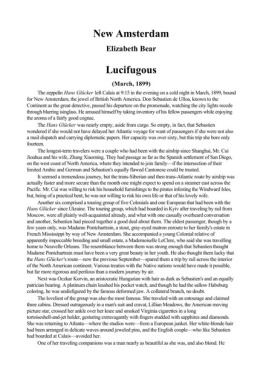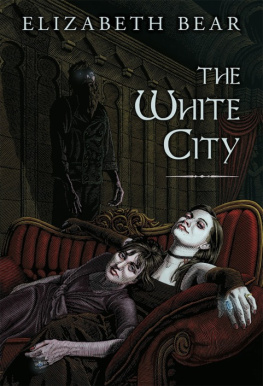Elizabeth Bear - New Amsterdam
Here you can read online Elizabeth Bear - New Amsterdam full text of the book (entire story) in english for free. Download pdf and epub, get meaning, cover and reviews about this ebook. year: 2008, publisher: Far Territories, genre: Detective and thriller. Description of the work, (preface) as well as reviews are available. Best literature library LitArk.com created for fans of good reading and offers a wide selection of genres:
Romance novel
Science fiction
Adventure
Detective
Science
History
Home and family
Prose
Art
Politics
Computer
Non-fiction
Religion
Business
Children
Humor
Choose a favorite category and find really read worthwhile books. Enjoy immersion in the world of imagination, feel the emotions of the characters or learn something new for yourself, make an fascinating discovery.
- Book:New Amsterdam
- Author:
- Publisher:Far Territories
- Genre:
- Year:2008
- Rating:5 / 5
- Favourites:Add to favourites
- Your mark:
- 100
- 1
- 2
- 3
- 4
- 5
New Amsterdam: summary, description and annotation
We offer to read an annotation, description, summary or preface (depends on what the author of the book "New Amsterdam" wrote himself). If you haven't found the necessary information about the book — write in the comments, we will try to find it.
New Amsterdam — read online for free the complete book (whole text) full work
Below is the text of the book, divided by pages. System saving the place of the last page read, allows you to conveniently read the book "New Amsterdam" online for free, without having to search again every time where you left off. Put a bookmark, and you can go to the page where you finished reading at any time.
Font size:
Interval:
Bookmark:

New Amsterdam
(March, 1899)
The zeppelin Hans Glcker left Calais at 9:15 in the evening on a cold night in March, 1899, bound for New Amsterdam, the jewel of British North America. Don Sebastien de Ulloa, known to the Continent as the great detective, passed his departure on the promenade, watching the city lights recede through blurring isinglass. He amused himself by taking inventory of his fellow passengers while enjoying the aroma of a fairly good cognac.
The Hans Glcker was nearly empty, aside from cargo. So empty, in fact, that Sebastien wondered if she would not have delayed her Atlantic voyage for want of passengers if she were not also a mail dispatch and carrying diplomatic papers. Her capacity was over sixty, but this trip she bore only fourteen.
The longest-term travelers were a couple who had been with the airship since Shanghai, Mr. Cui Jioahua and his wife, Zhang Xiaoming. They had passage as far as the Spanish settlement of San Diego, on the west coast of North America, where they intended to join familyif the intersection of their limited Arabic and German and Sebastien's equally flawed Cantonese could be trusted.
It seemed a tremendous journey, but the trans-Siberian and then trans-Atlantic route by airship was actually faster and more secure than the month one might expect to spend on a steamer east across the Pacific. Mr. Cui was willing to risk his household furnishings to the pirates infesting the Windward Isles, but, being of a practical bent, he was not willing to risk his own life or that of his lovely wife.
Another six comprised a touring group of five Colonials and one European that had been with the Hans Glcker since Ukraine. The touring group, which had boarded in Kyiv after traveling by rail from Moscow, were all plainly well-acquainted already, and what with one casually overheard conversation and another, Sebastien had pieced together a good deal about them. The eldest passenger, though by a few years only, was Madame Pontchartrain, a stout, gray-eyed matron enroute to her family's estate in French Mississippi by way of New Amsterdam. She accompanied a young Colonial relative of apparently impeccable breeding and small estate, a Mademoiselle LeClere, who said she was travelling home to Nouvelle Orleans. The resemblance between them was strong enough that Sebastien thought Madame Pontchartrain must have been a very great beauty in her youth. He also thought them lucky that the Hans Glcker's routenew the previous Septemberspared them a trip by rail across the interior of the North American continent. Various treaties with the Native nations would have made it possible, but far more rigorous and perilous than a modern journey by air.
Next was Oczkar Korvin, an aristocratic Hungarian with hair as dark as Sebastien's and an equally patrician bearing. A platinum chain leashed his pocket watch, and though he had the sallow Habsburg coloring, he was undisfigured by the famous deformed jaw. A collateral branch, no doubt.
The loveliest of the group was also the most famous. She traveled with an entourage and claimed three cabins. Dressed outrageously in a man's suit and cravat, Lillian Meadows, the American moving picture star, crossed her ankle over her knee and smoked Virginia cigarettes in a long tortoiseshell-and-jet holder, gesturing extravagantly with fingers studded with sapphires and diamonds.
She was returning to Atlantawhere the studios werefrom a European junket. Her white-blonde hair had been arranged in delicate waves around jeweled pins, and the English couplewho like Sebastien had boarded at Calaisavoided her.
One of her traveling companions was a man nearly as beautiful as she was, and also blond. He wore his darker gold hair slicked back against his skull, a handlebar moustache accentuating planed cheekbones and a defined jaw. His name was Virgil Allen, and he was a wealthy farmer's son from South Carolina, and a playboy by reputation.
The other was a woman, the Boston authoress Phoebe Smith. She a fair-haired, bespectacled, sensible small woman with a stubborn tilt to her head, straight-spined in widow's black that did not suit her, her hands usually folded before her. She carried a little bag with a black paper-bound note-pad and fountain-pen, and every so often she would take them up and scribble a line.
A further six passengers had boarded at Calais. Two were Sebastien and his companion, Jack Priest, who presented every appearance of being a young man of excellent family. In truth, his breeding was no better than Sebastien's. Butalso like Sebastien'shis education was unparalleled, and a work in constant progress. He was seventeen years old and looked fifteen, with delicate bones and tousled fair hair like a girl's.
Three and four were Michiel and Steven van Dijk, Dutch businessmen travelling only as far as New Amsterdam, where even under English colonial rule there was still a thriving Dutch community. Michiel was the elder, fortyish, round-cheeked under graying, wavy fair hair, and plump without seeming heavyas light on his feet as if he was filled with the same hydrogen that bore up the dirigible.
Stevenpronounced stay-vanwas taller and younger and also plump, his dark hair cropped short, his cheeks usually flushed and his eyes glittering with good cheer. He kept a green miniature parrot in his cabin, or occasionally on his shoulder, and Jack was instantly enamored of them both.
And the final twothe ones who seemed determined to avoid all of the Colonials, both the British colonials and the Frenchwomenwere a couple in their twenties. Hollis and Beatrice Leatherby were Londoners moving house to take advantage of a political appointment in the Pennsylvania colony, where an ambitious young man could advance faster than in Albion. She was darkly lovely while he was a freckled redhead: a striking pair.
Sebastien learned those things easily enough. Observation was a long-honed habit, though he intended merely a minor distraction for the hours until he could decently be seen to retire. The journey overland had not been easy and Jack had been delayed, only joining him in Calais that afternoon.
Sebastien could not afford to be seen in good light until they had had a few minutes alone.
And so, from his solitary post at the dark end of the promenade, away from the too-revealing electric lights, Sebastien observed the other passengers and watched Jack.
Jack held court forward along the promenade, his admirers a potential source of amusement or inconvenience. He was drinking champagne rather than liquor, but his laughter told Sebastien enough about his conversation with Steven van Dijk and the Leatherbys to swamp that raft of faint reassurance in a sea of potential tribulations. He would flirt. And right now he was flirting with Mrs. Leatherby, immediately under her husband's oblivious eyeand sparing a little charm for van Dijk, as well.
Sebastien cupped his glass before his face, and pretended to taste the cognac. The sharp, drowning scent was good. It blunted his hunger, which threatened to grow overwhelming, and the snifter gave him something to occupy hands that wanted to tremble with desire.
The social dance was not distracting him tonight. He could feel it in the cut-glass edge on his senses, the heaviness of limbs that would transform into mercurial quickness when he required it. Too much more and his restraint would fail. He'd waited too long.
Discipline was always a matter of degree to such as Sebastien, and it had required a certain subterfuge and sleight of hand to free himself of old friends and allies. That alone had consumed days. His court would be
Next pageFont size:
Interval:
Bookmark:
Similar books «New Amsterdam»
Look at similar books to New Amsterdam. We have selected literature similar in name and meaning in the hope of providing readers with more options to find new, interesting, not yet read works.
Discussion, reviews of the book New Amsterdam and just readers' own opinions. Leave your comments, write what you think about the work, its meaning or the main characters. Specify what exactly you liked and what you didn't like, and why you think so.













